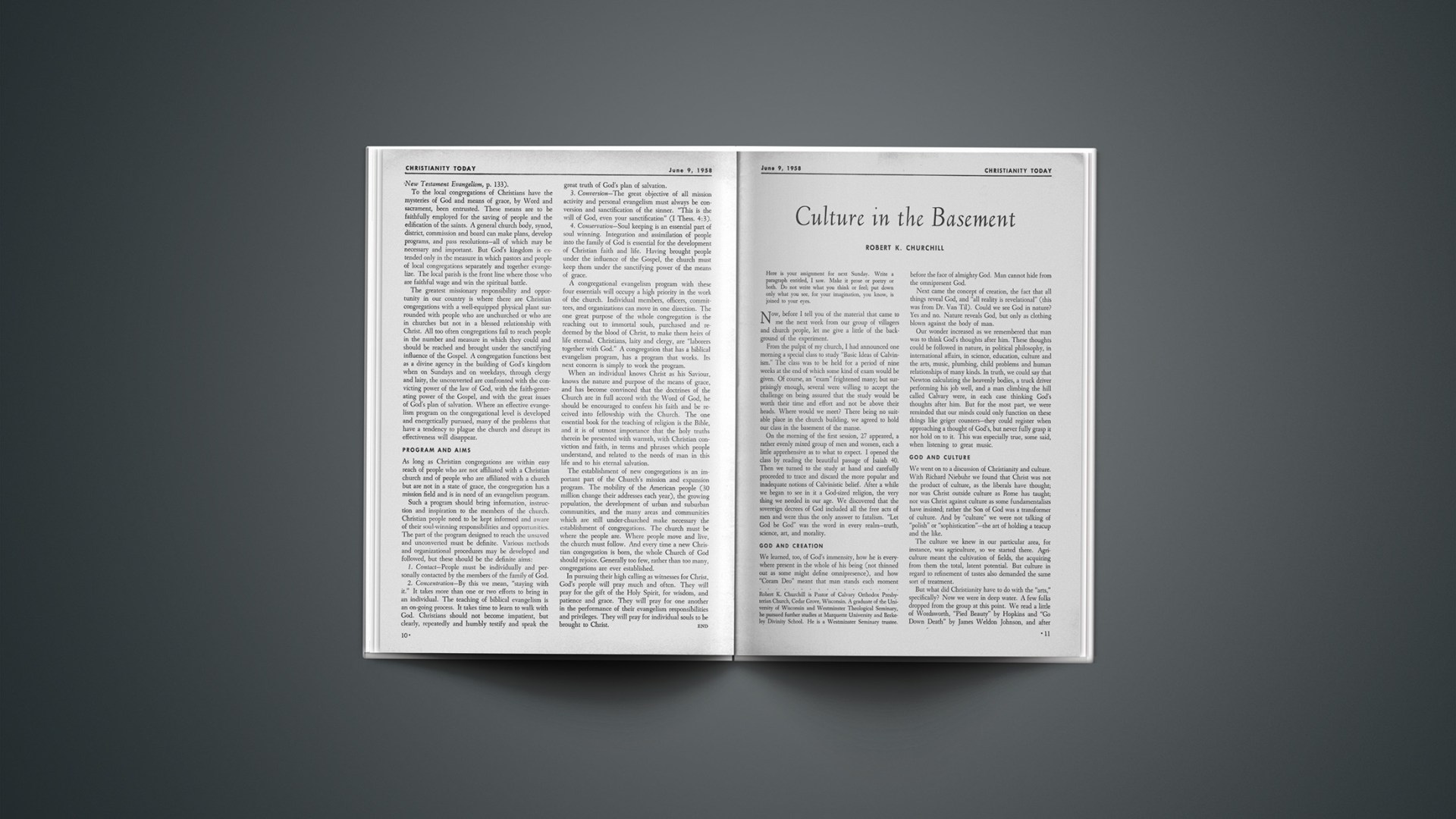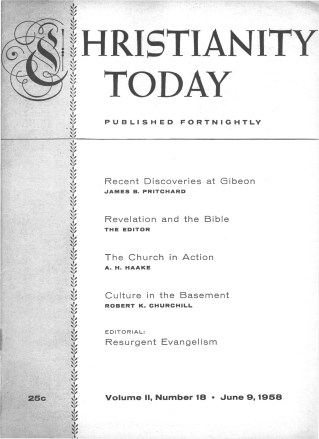Here is your assignment for next Sunday. Write a paragraph entitled, I saw. Make it prose or poetry or both. Do not write what you think or feel; put down only what you see, for your imagination, you know, is joined to your eyes.
Now, before I tell you of the material that came to me the next week from our group of villagers and church people, let me give a little of the background of the experiment.
From the pulpit of my church, I had announced one morning a special class to study “Basic Ideas of Calvinism.” The class was to be held for a period of nine weeks at the end of which some kind of exam would be given. Of course, an “exam” frightened many; but surprisingly enough, several were willing to accept the challenge on being assured that the study would be worth their time and effort and not be above their heads. Where would we meet? There being no suitable place in the church building, we agreed to hold our class in the basement of the manse.
On the morning of the first session, 27 appeared, a rather evenly mixed group of men and women, each a little apprehensive as to what to expect. I opened the class by reading the beautiful passage of Isaiah 40. Then we turned to the study at hand and carefully proceeded to trace and discard the more popular and inadequate notions of Calvinistic belief. After a while we began to see in it a God-sized religion, the very thing we needed in our age. We discovered that the sovereign decrees of God included all the free acts of men and were thus the only answer to fatalism. “Let God be God” was the word in every realm—truth, science, art, and morality.
God And Creation
We learned, too, of God’s immensity, how he is everywhere present in the whole of his being (not thinned out as some might define omnipresence), and how “Coram Deo” meant that man stands each moment before the face of almighty God. Man cannot hide from the omnipresent God.
Next came the concept of creation, the fact that all things reveal God, and “all reality is revelational” (this was from Dr. Van Til). Could we see God in nature? Yes and no. Nature reveals God, but only as clothing blown against the body of man.
Our wonder increased as we remembered that man was to think God’s thoughts after him. These thoughts could be followed in nature, in political philosophy, in international affairs, in science, education, culture and the arts, music, plumbing, child problems and human relationships of many kinds. In truth, we could say that Newton calculating the heavenly bodies, a truck driver performing his job well, and a man climbing the hill called Calvary were, in each case thinking God’s thoughts after him. But for the most part, we were reminded that our minds could only function on these things like geiger counters—they could register when approaching a thought of God’s, but never fully grasp it nor hold on to it. This was especially true, some said, when listening to great music.
God And Culture
We went on to a discussion of Christianity and culture. With Richard Niebuhr we found that Christ was not the product of culture, as the liberals have thought; nor was Christ outside culture as Rome has taught; nor was Christ against culture as some fundamentalists have insisted; rather the Son of God was a transformer of culture. And by “culture” we were not talking of “polish” or “sophistication”—the art of holding a teacup and the like.
The culture we knew in our particular area, for instance, was agriculture, so we started there. Agriculture meant the cultivation of fields, the acquiring from them the total, latent potential. But culture in regard to refinement of tastes also demanded the same sort of treatment.
But what did Christianity have to do with the “arts,” specifically? Now we were in deep water. A few folks dropped from the group at this point. We read a little of Wordsworth, “Pied Beauty” by Hopkins and “Go Down Death” by James Weldon Johnson, and after reading these, we were bent on more. That God should choose to reveal himself in poetry as well as prose gave us a fresh appreciation of the Bible. We reread the Sermon on the Mount and found it rhythmic like the waves of the ocean. The prophecies of Amos, the herdsman, came to us in words of haunting beauty, and the words of Isaiah rolled forth in rich musical sound. Even Moses in the law had his own majestic cadence. Beauties in the Bible of which we had never dreamed were revealed. But what was beauty anyway? Looking in Aquinas we pulled out the threefold definition: “unity, proportion, and gloritas.” That third word we could not define, but everybody claimed he knew what it was. Gloritas in anything was the glory of God appearing in wondrously mysterious fashion. And we also found that we were to believe in the beauty of holiness—this did not mean, of course, a holiness of beauty, nor a worship of art for its own sake.
The Gift Of Poetry
Still, we had not touched upon man’s imagination. Here was a new trail to blaze. We found that few writers had speculated upon the human creative gifts, those God-given powers of forming images of truths not fully present to the senses. We came to realize that souls must pass beyond the understanding derived merely from demonstration, or go unsatisfied; that the wider and deeper harmonies and stimuli come from imagination. God does not always present truth in propositional form. The prophets of old had been men whose imagination and vision mirrored the truth. The poetic imagery of David in the “green pastures,” the overflowing cup, the “valley of the shadow,” and others proved this.
But a word of caution! Imagination was not merely fancy or daydreaming. Its purpose was rather to serve a man’s convictions, and hold a healthy lens to his eyes. It could be a film on which eye objects were registered; and the more sensitive film was, the richer one’s life became. There was no need, then, to go on a journey to find the wonderful. Every square inch of the universe shouted with glory. One had only to stand still and behold it.
Challenge And Response
“So,” I said to the group at the close of one of these sessions, “write on what you see. And when I read your work next Sunday, what you have observed may be a startling revelation to us all.”
Something happened in our people that week, something that will be a part of their lives forever. I should repeat, my class of adults were very ordinary people. Some had gone through high school, and some had not; a few had gone a little beyond, but it did not matter. Men and women totally unused to writing struggled to describe and put into order some of the things they saw. And the result was, they found themselves creating from the most common of objects thoughts that were new and wonderful.
For instance, one farmer, looking at two dead birds lying upon a sink drain board, marveled at the design of their feathers and the way in which the soft colors were reflected in the light. It was winter and a housewife, who had hung out her wash after snowfall, saw in a new way the difference between God’s whiteness and man’s. Another wrote of her walk to church, and of the snow that fell on her sleeve in hexagon designs. She headed her paragraph “God’s Design.” And a truck-driver told of arriving home to find his wife fairly excited over a tree in the back yard holding new-fallen snow in “its upreaching arms.”
To be sure, each paper showed struggle. There was nothing of genius, perfection, or polish about any of them. But they did show, indeed, a genuine freshness of vision and understanding.
The experiment was a revelation. Permit just one illustration of a paragraph written by a plumber:
Winter’S Night
I watched the powdery snow fall from out the black vault of night into the streetlight’s peaked arch;
I saw the slotted shadow of the picket fence lie over the deepening snow;
I saw dead dry weeds stand stiffly in the shadow, historians of last year’s negligence, prophets of another June;
I saw the sentinel trees with their empty arms outstretched;
I saw light and dark, silhouettes and shadow,
houses with dark roofs merged into night,
flat snow-powdered roofs ready for baker’s dough.
A barren willow with snow encrusted limbs became a giant fountain spray from out my ermine lawn.
Preacher In The Red
GETTING THE BIRD
I had just started my sermon when a bird flew the length of the church. A few minutes later it flew back again. I proceeded only to have the bird repeat the performance. At last it decided that it would not stay still even for a few minutes. Up and down the church it flew and I had to stop. I saw it flutter to a tall window and I called out to a man sitting nearby: “Mr. H … that window opens.” He got up, opened it and the bird flew out. I tried to pick up the threads of my sermon and brought it to a conclusion. Then I announced the last hymn, “Pleasant are Thy Courts Above.” I did not dare look at the congregation as we sang the second verse:—
“Happy birds that sing and fly
Round thy altars, O Most High.”
—The Rev. PETER TADMAN, Saint Andrew’s Church, Sidcup, Kent, England.
Robert K. Churchill is Pastor of Calvary Orthodox Presbyterian Church, Cedar Grove, Wisconsin. A graduate of the University of Wisconsin and Westminster Theological Seminary, he pursued further studies at Marquette University and Berkeley Divinity School. He is a Westminster Seminary trustee.










